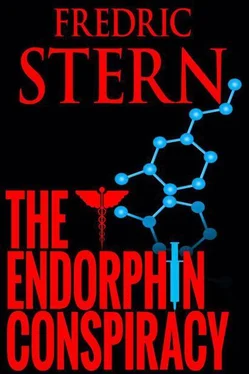“What do you know firsthand about PET scanning or endorphins?” Geoff tried to contain his rising anger. “I spent last year studying endorphin patterns in the brains of head injury patients using the PET scan. There is an excellent correlation between endorphin levels in the brain and coma prognosis. Dr. Kapinsky, one day you’ll learn all truth does not come neatly packaged in formulas.”
The medical students ducked behind the safety of their clipboards to avoid the verbal crossfire.
Kapinsky smacked his lips. “Why do runners all have this irrational, almost fanatic belief in the power of endorphins to control every aspect of the human mind? I can buy the claim they’re natural, morphine-like endogenous analgesics, but when you start telling me, without citing any data from controlled studies, that these compounds are responsible for everything from the anesthetic effects of acupuncture to the runner’s high in trained athletes and paranoid delusions in schizophrenics, well I think it’s a bunch of bullshit! I’m surprised as a physician and scientist you can accept such conjecture.”
After six years of almost constant conflict, Kapinsky knew precisely how to push Geoff’s buttons. What Geoff could never understand was what pleasure it gave him, except to compensate for Kapinsky’s feelings of inadequacy. To respond at this point would only escalate Kapinsky’s warped need for conflict, make rounds ever more counter-productive. “I’ll be more than happy to share my research data with you at another time, Kapinsky, but we have rounds to conduct.”
Beads of sweat dotted Kapinsky’s whitened upper lip. His jaw was clenched, his face gnarled in frustration.
Geoff turned his attention back to Mark Jackson. “Let’s talk about your treatment plan.”
“Sure. With her vital signs stable, I think we should concentrate our efforts at further resuscitation of her brain—”
Cathy Johannsen arrived from the nursing station and interrupted their discussion. “Geoff, Dr. Pederson’s secretary just called. She wanted to remind you about the three o’clock meeting in his office.”
“I thought it was four. Is she still on the phone?”
“No. She said she sent you an e-mail about it. She just wanted to remind you to be on time.”
“E-mail messages. God knows how many I have stacked up.” He looked up at the clock on the wall. “It’s two-thirty, and I haven’t even signed onto the system yet. Is the terminal in the staff room free?”
“I think so.”
Geoff looked over at Mark Jackson, waiting to discuss his treatment plan on the girl. “Mark, why don’t you and Kapinsky finish leading rounds. I’ve got to check my messages before the meeting with Pederson.”
“No problem.”
Geoff followed Cathy back to the nursing station and sat down at the vacant computer terminal. He enjoyed playing with computers, though he was hardly an expert. Nothing like his computer geek kid brother, Stefan. The extensive computerization at the Trauma Center dazzled Geoff. Even Stefan thought it impressive.
Geoff booted the computer, signed on, and entered his password.
Hello, Dr. Geoffrey Davis. Welcome to the Traumanet System.
You have three new e-mail messages. Would you like to view them?
Geoff manipulated the mouse and clicked on the e-mail icon.
MESSAGE #1 DATE: JULY 1, 2010 TIME: 0721
FROM: Alpha Micronet.org/syssad
Received: NYTC.org, 1 July 2010 0718.
MESSAGE: Hey bro. Good luck today. I know you’ll do a great job, as always! Stefan.
P.S.- How about dinner tonight?
Geoff smiled, appreciated the irony of Stefan’s message. His kid brother urging him on, the way Geoff had always been there for Stefan. He clicked on “Reply” and entered his response:
Thanks. I’ll call you later. Geoff.
Geoff clicked on message number two.
MESSAGE #2 DATE: JULY 1, 2010 TIME: 0900
FROM: L. EVERS; NYTC-A1/NSGLEE
MESSAGE: Dr. Pederson would like to see you today at three p.m. in his office for chief residency orientation meeting. Please be prompt. The doctor does not like to be kept waiting.
Thank you.
Geoff smiled, shook his head. It was probably going to be the same pep talk Pederson gave the last seventeen chief residents.
He clicked on the third message.
MESSAGE #3 DATE: JULY 1, 2010 TIME: 1037
FROM: Received by: Mercury, NYTC.org, 1 July 2010, 10:36; received: gopher/nih.gov, 1 July 2010, 10:33; received: relnet/info.umd.edu, 1 July 2010, 10:30; received: telnet/nasa.gov, 1 July 2010, 10:21; received: ber2759.USDA.gov, 1 July 2010, 10:17; received: cobalt, telnet/locis.loc.gov, 1
July 2010, 10:15.
MESSAGE: Keep your eyes open. Nothing is as it appears. Proteus.
Geoff stared at the cryptic message. What the hell did that mean? He noted the time it was sent: 10:15 a.m. He had been in the OR. Proteus. Obviously a code name. Geoff examined the extensive path the message had taken. It was from somewhere outside the medical center. The message must have been an error or simply meant for someone else.
Geoff clicked on the “Help” option of the e-mail screen then entered the Traumanet address book just for the hell of it and clicked on “search for sender address.” The search came up empty. The Traumanet address book didn’t include Internet addresses.
“Everything okay?” Cathy Johannsen asked.
Geoff continued staring at the cryptic message on the screen. “Yeah, fine. Just got someone else’s e-mail. It’s not the first time.”
Geoff moved the mouse and deleted the first two messages.
R. Phillip Lancaster sat in the rear of his black limousine gazing out the window, his mind lost in thought. He hated Washington in the summertime—the oppressive heat and humidity—and this was the most blistering summer of the last decade.
Worse yet, it was next to impossible to accomplish anything of substance during the summer months. Key staffers as well as elected officials on the Hill often took their vacations in July, and when they weren’t physically away, their minds were elsewhere, wilting in the heat or wishing they were playing somewhere, anywhere but here. Even the President, a man he had known since their college days at Yale, with whom he shared a reasonably close, but necessarily guarded friendship, seemed less interested in what Lancaster felt were important matters of national security and more interested in going fishing. Might as well close down the shop and hang up a sign: “Sorry, closed ‘til after Labor Day.”
Frustrating indeed for Lancaster, paragon career intelligence officer, a role he had played for over thirty years, a role that had augmented his value throughout numerous administrations of both political parties but limited his ascendance as well.
With last year’s election of his long time associate William Cabot to the White House, Lancaster had made the erroneous and atypically naive assumption that friendship would transcend politics and he would be at the helm at Central Intelligence. He felt it, visualized it, tasted it. Political debts intervened, and he was passed over for an inexperienced dolt, Dick Bennington, the President’s former campaign chairman.
Cabot appointed Lancaster Deputy Director for Science and Technology, but Lancaster wasn’t ready to throw in the towel just yet. His years of training had taught him there was a solution for every seemingly no-win situation. He was resourceful and willing to adjust rules if need be.
Sixty- two years old, tall, but by no means willowy, his silver, perfectly coiffured hair and aquiline profile telegraphed his blue-blood Bostonian roots. Lips taut, cleft chin resting on his fist, Lancaster peered through the limousine window down the tree-lined street of Alexandria, Virginia. Today, while the rest of Washington was on vacation, R. Phillip Lancaster worked to solve his no-win scenario.
Читать дальше












